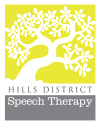Early language skills refer to the development of preverbal skills (e.g. eye contact, joint attention, imitation), receptive language skills (i.e. understanding gestures and words) and expressive language skills (i.e. using gestures, sounds and words). These skills are developed through play and with interactions with people and the environment.
During an assessment at Hills District Speech Therapy, the Speech Therapist will look at a child’s development in their early language skills through a fun and play-based assessment, and in conversation with their parents/carers as they are the ones who know the child best.
During therapy sessions, we acknowledge that parents and carers play a very important role in early language skill development, and consequently, we ensure that they play an active role in the therapy process. Parents and carers will be supported in better understanding their child’s language skills and applying key language stimulation strategies to their everyday interactions and play.
Some key strategies that parents and carers may learn during therapy including:
- Getting down to your child’s level: being face to face with a child and at their eye level (or lower) allows parents and carers, and the child to start and maintain an interaction with each other. It allows parents and carers to better observe the child’s interests and what they may want to communicate, and allows the child to better listen and learn from the interaction.
- Following the child’s interest: children learn best when they are interested and engaged in what they are playing with or being talked to about. This also allows them to maintain their attention. Parents and carers should observe what their child is interested in and getting involved by playing with the same toys and making comments about what the child is doing at that exact moment.
